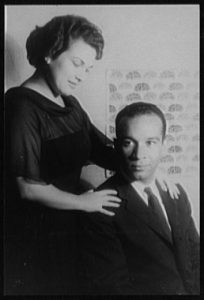
Carl Van Vechten, Portrait of Marilyn Horne and Henry Lewis, 1961, in Library of Congress Prints and Photographs Division Washington
Henry Lewis, a prodigious Bass Player, was the first black performer in a Major orchestra in the US. He won a job in the LA Phil in 1948 at the age of 16, becoming not just the first black player to play in a major orchestra, but also the youngest player of any race to win such a job1. Lewis’s impacts on American Music were noted by contemporaries as he was appointed conductor of the New Jersey symphony. He also served as a conductor for service orchestras in the Army stationed in Europe2.
Lewis’s story in American Classical music forces us to consider the notion of whiteness in American Classical Music. Classical music in the U.S. has almost earned the label of “whiteness”. When we look at the musicians, the composers, the audiences, one would imagine that classical music has always been an institution by white people for white people. However this is not necessarily the case. Lewis’s position followed the rise of Black composers such as Burleigh, Price, and Dawson3. The National Conservatory in New York led by Dvorkak, seemed to be pushing a more diverse slate of classical music. However 30 years after Lewis’s death, only 2% of musicians in major orchestras are black and 4% of conductors of major orchestras are black4.
So where has the United States lost its momentum in diversifying classical music? One culprit may be music education. In his dissertation, Brian Gellertsein discusses the pervasive white supremacy that prevails throughout music education, despite years of understanding that classical music in the US has a diversity problem. He even suggests that our education of music educators is partly to blame, with standards for graduation and entrance that favor white, wealthy, better prepared students5. While Gellerstein finds no shortage of problems with music education, he is rather short on solutions. His argument also potentially implies that the key to more Black musicians may be removing the emphasis on classical music; a point that while maybe bears merit, poses new problems for the problem of diversifying classical music as an institution.
At an institution like St. Olaf, that works with a great deal of music educators, it is important that we not let the progress made by musicians like Henry Lewis go unfollowed. It is critical that we continue to look critically at the ways ensure diverse practices among our professors and future educators alike to build upon the legacy of Black classical music in the US.
1
“The Legacy of Henry Lewis: Watch & Listen.” LA Phil, www.laphil.com/about/watch-and-listen/the-legacy-of-henry-lewis. Accessed 27 Sept. 2023.
2
Henry lewis, pioneer black classical music conductor and dir. 1996. Jet. Feb 26, https://www.proquest.com/magazines/henry-lewis-pioneer-black-classical-music/docview/199975173/se-2 (accessed September 27, 2023).
3
Huizenga, Tom. “Why Is American Classical Music so White?” NPR, NPR, 20 Sept. 2019, www.npr.org/sections/deceptivecadence/2019/09/20/762514169/why-is-american-classical-music-so-white.
5
Robin, William. “Great Divide at the Concert Hall.” The New York Times, The New York Times, 8 Aug. 2014, www.nytimes.com/2014/08/10/arts/music/black-composers-discuss-the-role-of-race.html.
5
Gellerstein, Brian. “DARING TO SEE: WHITE SUPREMACY AND GATEKEEPING IN MUSIC EDUCATION.” University of Massachusetts Boston, 2021.
